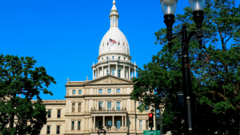Did a Michigan Judge Just Dismiss Charges Against 'Fake' 2020 Electors?

Published: 2025-09-09 23:35:14 | Category: wales
This article examines the recent dismissal of criminal charges against 15 Republicans who attempted to impersonate electoral college members in a bid to overturn the 2020 presidential election results. A judge ruled that the group acted on their belief in widespread voter fraud rather than with malicious intent, raising questions about the limits of political actions in the electoral process.
Last updated: 27 October 2023 (BST)
Understanding the Case Against the Republicans
In a significant legal development, a Michigan district court judge dismissed charges against a group of 15 Republicans involved in a controversial attempt to undermine the electoral outcome of the 2020 presidential election. These individuals, believing unfounded claims of voter fraud, sought to present themselves as legitimate electors for Donald Trump instead of the duly elected Democratic representatives. This incident highlights the complex interplay between political beliefs, legal accountability, and the electoral process in the United States.
Key Takeaways
- A judge dismissed charges against 15 Republicans for attempting to pose as electoral college members.
- The court ruled that the defendants acted out of a sincere belief in election irregularities.
- Michigan Attorney General expressed disappointment and is considering an appeal.
- This case is part of a broader trend with similar cases in multiple states.
- The ruling raises questions about the limits of political actions in the electoral process.
The Events Leading to the Charges
The backdrop of this case is rooted in the highly contentious 2020 presidential election. Following allegations of widespread voter fraud by then-President Trump and his supporters, a group of Republicans in Michigan convened secretly in December 2020. They signed documents claiming to be the legitimate electors representing the state, despite Joe Biden winning the election by a margin of approximately 135,000 votes.
Michigan's electoral votes were crucial, as Biden secured all 16 of them, contributing significantly to his overall victory of 306-232 in the Electoral College. The actions of these Republicans were part of a broader effort to challenge the election results, which ultimately led to the storming of the US Capitol on 6 January 2021, as Trump supporters sought to overturn the election outcome.
Legal Grounds for Dismissal
Judge Kristen D. Simmons ruled that the defendants did not possess the necessary sophistication to fully understand the electoral process, which played a significant role in her decision to dismiss the charges. The judge noted that the group did not attempt to forge official seals or signatures, which are typically considered more serious forms of fraud.
Instead, she characterised their actions as stemming from a genuine belief in alleged irregularities within the election system. This perspective raises an intriguing question: to what extent can belief in misinformation absolve individuals from legal accountability in political actions?
The Reaction to the Ruling
The dismissal of charges has prompted varied reactions. Michigan Attorney General Dana Nessel expressed her disappointment, stating that the ruling undermined the integrity of the electoral process. She described the actions of the defendants as a coordinated effort to overturn the will of the people, emphasising the seriousness of their attempts.
Conversely, John Freeman, a lawyer representing one of the defendants, characterised the ruling as a validation of the legal system. He referred to the case as a politically motivated "witch hunt," suggesting that the prosecution was more about political retribution than genuine legal concerns.
The Broader Context: Similar Cases Across the US
This ruling in Michigan is not an isolated incident. Other states, including Arizona, Georgia, Nevada, and Wisconsin, are grappling with similar cases involving individuals who have attempted to impersonate electoral college voters. These ongoing legal challenges reflect a growing trend of political manoeuvring in the face of contested election outcomes.
The implications of these cases extend beyond individual accountability. They raise crucial questions about the robustness of democratic institutions and the potential consequences of political actions that seek to undermine electoral integrity.
The 2020 Election and Its Aftermath
The 2020 presidential election was marked by significant controversies, driven in part by the COVID-19 pandemic, which altered traditional voting processes. Many states implemented new voting rules that resulted in extended counting times, which some viewed as opportunities for fraud. Trump's refusal to concede and his continued claims of election irregularities galvanized a significant segment of his supporters, leading to heightened tensions and ultimately the January 6 Capitol riot.
In Michigan, Biden's victory was a pivotal moment, reflecting broader national trends in voter turnout and demographic shifts. The election saw record participation, with millions of Americans casting their votes amidst the challenges posed by the pandemic.
What Happens Next?
The future of this case remains uncertain, as Michigan's Attorney General has indicated that her office is considering an appeal against the judge's ruling. If pursued, this could set a significant legal precedent regarding the accountability of political actors in similar circumstances.
Moreover, the ongoing investigations and legal proceedings in other states will likely draw further scrutiny as they unfold. The outcomes could influence not only the individuals involved but also the broader political landscape as the nation prepares for future elections.
Conclusion: Navigating the Intersection of Politics and Law
The dismissal of charges against the Michigan Republicans underscores a complex intersection between political belief and legal accountability. As similar cases unfold across the country, the implications for electoral integrity, political conduct, and public trust in democratic institutions are profound. The outcomes of these legal battles could reshape the political landscape, raising vital questions about the boundaries of political actions in a democracy.
As we reflect on these events, it becomes increasingly clear that understanding the motivations behind political actions is essential to maintaining the integrity of democratic processes. How will future courts navigate these challenges, and what standards will be established for political conduct in a democratic society? These questions remain at the forefront as the nation continues to grapple with the legacy of the 2020 election and its aftermath. #PoliticalIntegrity #ElectoralProcess #2020Election
FAQs
What charges were dismissed against the Republicans in Michigan?
The charges included forgery, conspiracy, and other related offences that stemmed from their attempt to pose as electoral college members after the 2020 election.
Why did the judge dismiss the charges?
The judge ruled that the defendants acted out of a sincere belief in election irregularities and did not possess the sophistication to fully understand the electoral process.
What are the implications of this ruling?
The ruling raises questions about the limits of political actions and accountability in the electoral process, potentially influencing similar cases across the country.
What was the reaction from the Michigan Attorney General?
Michigan Attorney General Dana Nessel expressed disappointment with the ruling and mentioned the possibility of filing an appeal, viewing the actions of the defendants as a serious threat to democratic integrity.
Are there similar cases in other states?
Yes, similar cases involving individuals posing as electoral college voters are pending in several states, including Arizona, Georgia, Nevada, and Wisconsin.


